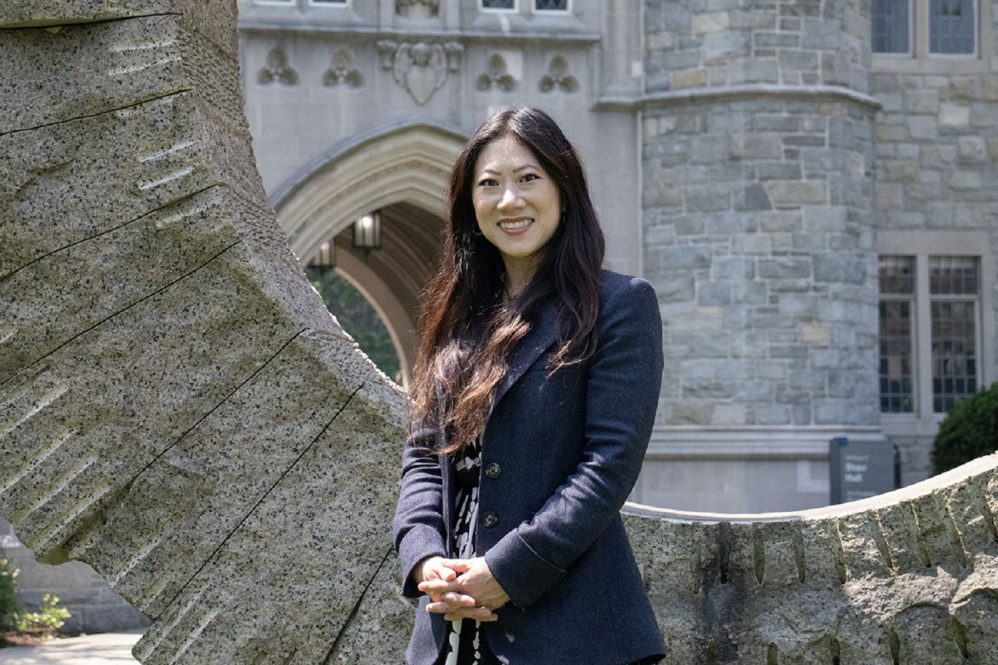The UConn School of Law is opening the Transactional Law Clinic, its seventh in-house legal clinic. The clinic will offer pro bono services to small businesses, nonprofit agencies, and individuals in transactional and regulatory matters.
Casey Faucon, who started a similar clinic at the University of Alabama School of Law, joined the UConn Law faculty as clinic director and associate professor.
“UConn Law is proud to have the opportunity to add to the services we offer our community while imparting essential skills and knowledge that will benefit our students throughout their careers,” Dean Eboni S. Nelson says. “We are excited that Professor Faucon has joined us and look forward to the impactful contributions the Transactional Law Clinic will make under her leadership.”
The clinic, which has enrolled students for the fall semester, will help small businesses and individuals navigate transactions and regulations to expand their businesses, mitigate their risks and feel comfortable engaging in deals.
“Legal costs are so expensive for small businesses,” Faucon says. “We want to be able to provide help to the community.”
She anticipates clients will include small businesses, community development organizations, creative talents such as authors and artists, student and professional athletes, as well as non-profit agencies and more.
Services include contract review and negotiation, startup governance and filings, entity formation and document drafting. The clinic will offer industry-specific regulatory advice or representation in front of bodies like the Food and Drug Administration and the Environmental Protection Agency. The clinic will also advise and represent clients seeking business licenses from local municipalities or tax-exempt status from the IRS.
“Some clients know exactly what they need because they’ve been doing this for years, and they know exactly what needs to be done,” Faucon says. “Others are looking to the student attorneys for where they start. They might not know what kinds of regulations they’re going to be subject to or where to file various documents.”
She wants to be able to serve clients anywhere on that spectrum, and to empower students to be able to help no matter what the clients come in with.
Eventually, Faucon would like to offer workshops to reach a broader audience of individuals and businesses than they will be able to work with one-on-one.
At the Alabama Law Entrepreneurship & Nonprofit Clinic, which she started in 2018, Faucon built partnerships with the business school and the university’s athletics department. The clinic has helped students launch businesses in fields ranging from fashion design to music and assisted student athletes launch nonprofits and navigate name, image and likeness deals. She hopes to build similar relationships at UConn.
The Alabama clinic’s clients have included a pickleball group looking to bring more courts to the area and a student organization using drones to reforest areas of Alabama. Faucon intends to serve a similarly wide range of businesses and organizations in Connecticut.
“We are excited to help individuals and small businesses to plan transactions and navigate regulatory issues,” Associate Dean for Experiential Education Jessica Rubin says. “The clinic will provide our students with training in important legal skills – interviewing and counseling clients and drafting and negotiating contracts. Professor Casey Faucon brings experience in all these areas and will be a valuable resource for our students and community members.”
The Transactional Law Clinic is the newest of seven in-house clinics operated by UConn Law faculty to serve the community while training law students.
The law school also hosts an Animal Law Clinic, Asylum and Human Rights Clinic, Criminal Defense Clinic, Housing and Eviction Defense Clinic, Intellectual Property and Entrepreneurship Law Clinic, and Tax Clinic. I n addition, UConn Law offers six clinics in partnerships with affiliated organizations.



